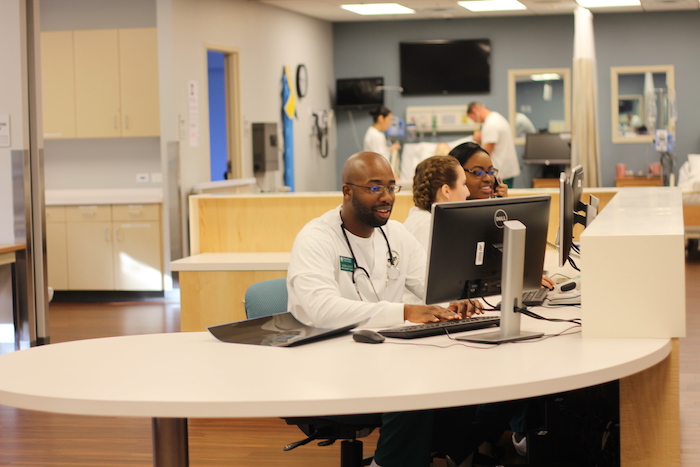Nursing Informatics

Why Choose Our Program?
Are you ready to take your nursing career to the next level? Our Master of Nursing Informatics program is designed to provide a convenient way for working registered nurses to earn their graduate degrees. Graduates of the Informatics program take on crucial IT positions within healthcare organizations such as Chief Medical Information Officer, Informatics Coordinator, and Director of EHR Support, among others.
Our degree is offered in part-time and full-time tracks so you can learn at your own pace
If you already have a Master of Science in Nursing, you may be interested in the Nursing Informatics post-graduate certificate.
START YOUR APPLICATION
VIRTUAL INFORMATION SESSION
Request to watch a previous virtual information session. These sessions will allow you to learn more about our program, hear from faculty and understand the admissions process.
Earn an MSN Your Way
JU's Nursing Informatics program prepares you to take the next step in your career whether that be a promotion or graduate school. The Informatics program was designed for you to complete your way:
- Small classes provide you with individual attention
- Courses offered online (synchronous and asynchronous)
- Courses offered in 7-week flexible course formats that allow you to take terms off when you need it
- Work with an academic advisor throughout the program who will assist you with individualizing your program progression in a way that works for your schedule.

About Our Program
When you graduate from this program, you will have a Master of Science in Nursing with a concentration in Nursing Informatics.
Curriculum
MSN Core
- NUR 510: Nursing Theory & Research I
- NUR 512: Organization, Delivery, and Policy in Healthcare
- NUR 514: Nursing Leadership and Advanced Roles
- NUR 516: Information Systems & Technology for Improved Healthcare
- NUR 520: Nursing Research & Theory II
- NUR 551: Advanced Role Practicum
Informatics Core
- NUR 584: Foundations of Nursing Informatics
- NUR 585: Advanced Nursing Informatics I
- NUR 586: Advanced Nursing Informatics II
- NUR 587: Population Health Informatics, Epidemiology, and Evidenced Based Nursing Informatics in a Global Society
Discover a Modern Nursing EducationImmersive Learning in Healthcare
Dive into a unique learning experience; with Jacksonville University's Keigwin School of Nursing. Students will be immersed in experiential learning utilizing virtual reality labs, telepresence robots, simulation scenarios, and research, giving them first-hand knowledge of patient care.
Immersive Learning in Healthcare
My name is Amber Santos and I am the Director of Innovation and Quality. And what that just means, is that part of my job is to bring [in] innovative active learning into our curriculum. It’s important for a nursing school to continually evolve. We can’t just do the status-quo type of learning and education that we’ve always done. We need to evolve as a school, and part of that is bringing in the technology needed for today’s students in today’s healthcare.
We’re seeing VR explode in the training industry for a lot of different reasons. We
started looking at software that’s out there for the nursing program. There’s actually
a surprising number of products that tailor to this type of experience, training nurses
and other medical professions. Share Care U has excellent graphics that lets you go
inside the human body and see different parts of anatomy and physiology, and then
a few others [that] provide simulation experiences where you’re actually in the hospital
next to a patient conducting procedures.
Virtual Reality is an immersive learning tool that we use, and once they put on those
goggles they’re literally immersed into that environment. So, we can talk in the classroom
about plaque buildup in our arteries and atrial sclerosis, but when they get into
that VR world, this immersive world, they get to actually see it and they get to interact
with it. [So] they can see how the blood flows through a vessel and how over time,
plaque builds up. And then they can also click a box and see how a stent is placed
into the vessel. So, it really just immerses them, and it provides a deeper level
of learning and understanding.
My name is Melissa McCray and I am the Student Success Specialist and an assistant
professor with the Keigwin School of Nursing. What helps nursing students be successful
in nursing school is the use of technology; that’s really a key component. What we
are seeing more and more, is very tech-savvy nursing students and that’s great because
when you’re in the field of nursing, technology is being introduced every day. And
so it’s important that those students are educated in our nursing programs to use
some of this technology and interact with that technology. Like I can spin the lungs.
Sorry, I’, geeking out a little, there are a lot of secondary benefits from the type
of learning we’re providing to our students. It can be just them being a little bit
more familiar with the technology, so when they see it in the healthcare setting,
and they see a telepresence robot rolling down the hall of the facility they’re working
in, they will already have seen that and they will understand how to interact with
that and communicate. They will also understand that even though that’s a telepresence
robot that could be a family member on the other end, so they still have to have that
caring spirit of a nurse. And part of that is worked into our simulations so that
they understand that while technology is a wonderful thing, it can never replace the
impact a nurse can have. The caring part of what we do.
AdmissionsHow to Apply
- Completed JU Application
- Unofficial Transcripts from all colleges and universities attended with All Nursing
Coursework & Nursing Degrees
- If the candidate attended a college or university abroad, an official NACES evaluation of that transcript is required. Choose the course-by-course evaluation with the GPA option.
- A minimum 3.0 undergraduate nursing GPA on a 4.0 scale is required
- The following may be requested of students with a GPA of 3.0 or below
- GRE/GMAT scores
- Letters of Recommendation
- Graduation from a regionally accredited program and CCNE, NLN, or ACEN accredited program
- Resume or Curriculum Vitae (if applying to a Nurse Practitioner track)
- Statement of Intent
- Active U.S. Nursing License
- Out-of-state applicants must be eligible for endorsement in Florida
- International students must hold a current license from a U.S. state and be eligible for endorsement in Florida.
- All international students whose first language is not English are required to submit proof of their proficiency in English, by providing scores for either: IELTS or TOEFL. If submitting score reports, they must be sent directly to Jacksonville University from the testing institutions.
Request for Information
Contact Information Keigwin School of Nursing
Brooks Rehabilitation College of Healthcare Sciences
Phone: (904) 256-7000
Email: graduateadmissions@ju.edu
